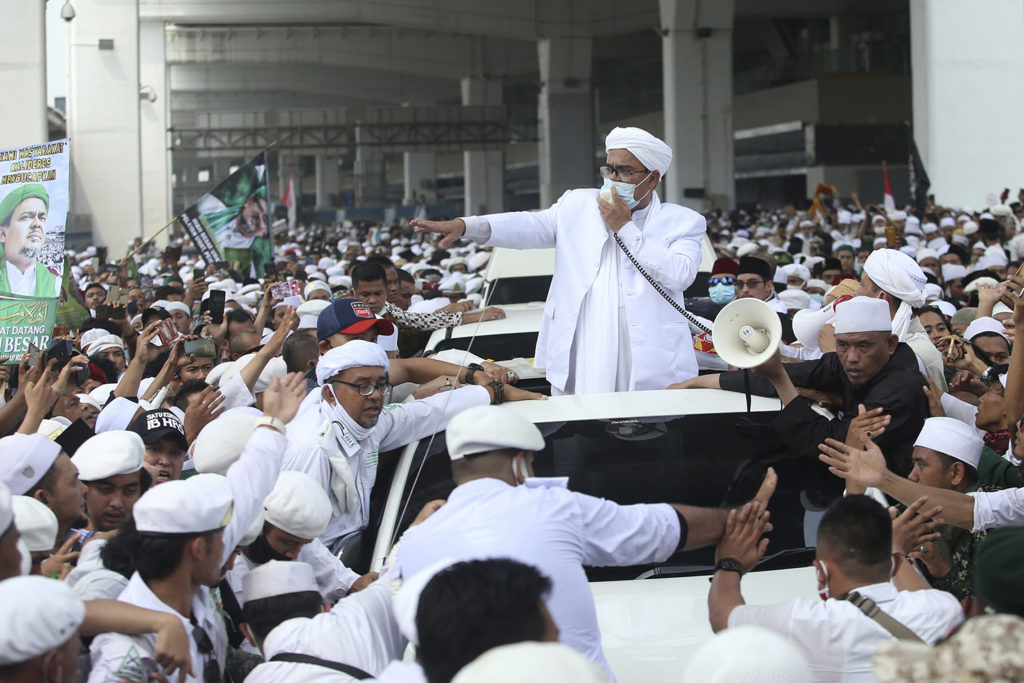Australia/Israel Review
Asia Watch: Unwelcome return
Nov 30, 2020 | Michael Shannon

They began to flock towards Jakarta’s Soekarno-Hatta airport from around 4 am and their number steadily grew to tens of thousands. Many of them parked their cars on the roadsides, worsening the congestion. Others were forced to leave their taxis or ride-sharing vehicles and walk to the airport. Among them were pilots and crew members, resulting in the cancellation of dozens of flights.
Waving banners and placards, the crowd erupted with joy when their idol emerged. Yet, it was not a pop star or sports champion, but Rizieq Shihab, the 55-year-old leader of the Islamic Defenders Front (FPI). Wearing a white robe, turban, and face mask, he stood up in the sunroof of a car and waved as his motorcade struggled to pass through the throng of followers chanting “Allahu Akbar!” (God is great).
Such was the scene for Rizieq’s return from a three-year exile in Saudi Arabia, which clearly shows his presence will be a new factor in Indonesian politics, although opinion is divided as to his likely impact.
Created after the fall of the Suharto regime in 1998, the FPI declared itself to be a Sharia-inspired “anti-vice” organisation and soon gained notoriety for destroying bars and brothels through “sweeps” carried out by its white-robed members. This extended to verbal and physical attacks against religious minorities.
Rizieq has served a total of two years in jail – in 2003 and again in 2008 – for inciting his followers to carry out violent acts. In 2011, leaked US diplomatic cables claimed the police had been funding the group and using it as an “attack dog” to extort businesses.
Yet, while the FPI is not a political party, it has proved a useful tool in political power plays. It has endorsed candidates and retains the ability to mobilise huge numbers, well in excess of its 200,000 members.
Prabowo Subianto courted the group to support his presidential bids, as well as the infamous campaign to bring about the downfall of popular Jakarta governor Basuki “Ahok” Tjahaja Purnama on trumped-up blasphemy charges in 2017.
Rizieq left for a pilgrimage to Mecca, Saudi Arabia, that same year amid allegations of adultery and violating the 2008 Anti-Pornography Law by exchanging sexually explicit text messages with a woman who was not his wife. He was also facing several legal issues for prior conduct, including defamation and treason concerning his speeches.
Even in exile, Rizieq remained a controversial figure. In late 2018, Saudi authorities briefly detained him for hoisting a flag at his Mecca residence that resembled the black standard of the Islamic State, whose caliphate was then approaching collapse.
Although police dropped the charges against Rizieq in 2019, citing insufficient evidence, he maintained that the accusations against him were politically motivated. Upon his return, he declared: “To all Muslims, the moral revolution begins today. Those who are not devout must now be devout. Do you agree?”, to which Rizieq’s followers shouted full approval. “Move from bad deeds to good deeds. We will destroy all injustice. We will fight corruption,” he said.
Some analysts doubt Rizieq’s ability to mobilise the same forces on Jakarta’s streets as he did as one of the leaders of the “212 Movement” which brought about Ahok’s downfall. President Joko Widodo (often referred to as Jokowi) comfortably won re-election in 2019, warding off an Islamist-backed challenge from Prabowo, who has since become a key minister in the government he once opposed.
President Widodo also moved to crack down upon groups espousing ideology in conflict with the pluralist state ideology of Pancasila, banning outright Hizb ut-Tahrir Indonesia, a smaller group that campaigned for a global caliphate. In an AP interview last year, Widodo said he would try to work with Islamist groups, but declared, “If an organisation endangers the nation in its ideology I won’t compromise.”
Rizieq’s return will be a political test for Jokowi, Ujang Komarudin, a political analyst at Jakarta’s Al Azhar University, told BenarNews. “His return has created an opportunity for major consolidation in the non-parliamentary opposition camp.”
South-East Asia analyst Zachary Abuza sees risks for Jokowi. “Jokowi’s clear 2019 electoral mandate has been quickly eroded by poor policy choices, the botched COVID-19 response, and a contracting economy. His legitimacy is waning… Sharp economic downturns are always a boon to extremist groups, which seek to scapegoat and provide needed assistance to their in-groups,” he wrote in BenarNews.
Even during Rizieq’s three-year absence, there was an uptick in violence toward religious minorities. Between 2017 and 2019, at least 23 attacks targeted minority houses of worship, including attacks on Ahmadi and Shi’ite mosques as well as Christian churches.
“Rizieq will only seek to escalate such attacks,” Abuza predicts, “forcing the government to either acquiesce or come to the defence of non-Muslims, and setting them up for charges of apostasy… Rizieq is set to reassert his influence in politics and upend the political status quo.”
Tags: Indonesia, Islamic Extremism






